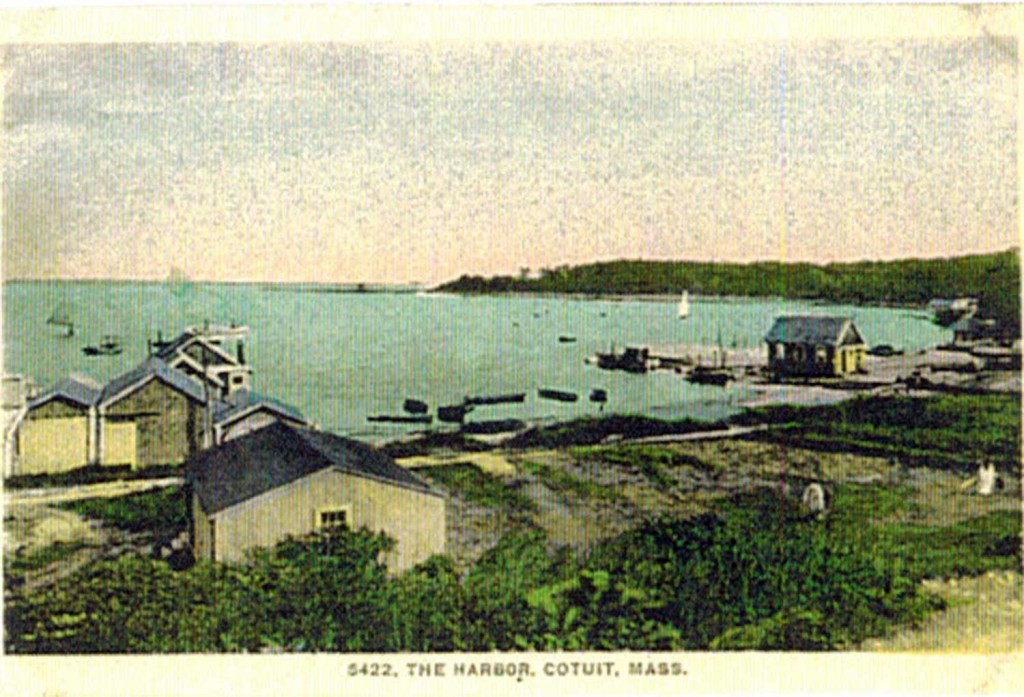Courtesy: Historical Society of Santuit and Cotuit
Written by Harold D.Smith, Jr.
For almost as far back as anyone can remember, the name Milton Crocker has been synonymous with the grocery business in the village of Cotuit. Spanning eight decades, Milton Crocker has worked in nearly every aspect of marketing groceries: first as a clerk, then store manager and, finally, as owner of the Cotuit Cooperative Grocery Company, known to locals and summer people as the Coop. He has lived the grocery business in Cotuit, remaining at work well past traditional retirement age. He has seen the economy of the village change: the days when goods were carried by train from Boston to West Barnstable and hauled to the village by carriage, the depression of the 1930’s when he relied on the good faith of his customers to pay the bills, the more recent business trend when the entrepreneurial spark dwindled in Cotuit and rekindled in Hyannis. Through all these years, the Coop has remained a landmark at the entrance to the village, and Milton Crocker has become a symbol of the village’s tradition inside that landmark.
Milton came from West Barnstable to Cotuit at the age of five after the death of his mother. He lived with his sister, nine years his senior, who had married Fred Parker. Parker was the man who first introduced Milton to the grocery business.
Fred’s father owned a grocery store in West Barnstable, but Fred decided to open his own store in Cotuit so that he would be able to go boating in his off hours in Cotuit Harbor.
In 1912, after three years of high school, Milton went to work full-time at Parker’s store. He started as a clerk, stocking shelves, keeping inventory, taking and delivering orders. Milton covered three routes, Highground, Santuit and the School Street area, stopping on the first day to pick up the orders and, on the second day, to deliver. A few orders were delivered by rowboat to select customers on “The Island,” Grand Island, now Oyster Harbors.
When Fred Parker decided to sell out the business during World War I in order to go into trucking, the Cotuit Grocery was acquired as an investment by Howard Dottridge, Ulysses L. Hull and Benjamin Franklin Sears. The word “cooperative” was added to the title but the partners never carried out their original intention of selling shares. Fred Parker died in the flu epidemic of 1918 at the age of thirty-eight. Within a relatively short span of time, Milton Crocker gained ownership of the store by acquiring the shares of two of the partners upon their deaths. Howard Dottridge’s interest was inherited by his daughter, Grace, who became the bookkeeper. Eventually, Milton attained full ownership.
The original store, a three-story building, faced on Main Street at the southeast corner of Main and what is now Oyster Place Road. On the north side was a small telephone office, later a tailor shop. The upper floor was occupied by the Quimquissett Men’s Club, complete with pool room. Attached at the southside, and separated by a partition, was the popular jewelry store of Frank Mercure and he lived in quarters above. A small building to the south (now expanded to the present-day real estate office) was an ice cream parlor operated by Birja Hickey, daughter of Wallace Ryder, the painter. Down by the water, near the present Town Dock, stood several oyster shacks and Bennett Dottridge’s coal yard. The coal was shipped in by schooner from New Bedford.
In those days, Mr. Crocker remembers, Cotuit was bustling. The oyster business was thriving, seeding the harbor with “the best flavored oysters around,” he said. The corner of Main and School Streets served as the village center as, indeed, it is today.
“For a small village, it was pretty big. The harbor brought a lot of people here. It was a good harbor,” he said. At this time, sea captains with names like Carleton B. Nickerson, Richard Handy and Ulysses Hull sailed out of Cotuit. Business was booming.
“The railroad was very important,” Milton recalled. “There were trains that came in at half-past six and eight in the morning, passenger trains. Then, once a week, there was a freight train. All the trains came into West Barnstable, and goods would be carted to the different villages. Times were good.”
Busy as he was, Milton did not give his entire attention to the store. He served on the Cotuit Volunteer Fire Department as Assistant Chief under Chief Seabury Childs. And he had a hobby dear to his heart – he played the cornet – “what they call a trumpet today.” He was a member of a six-piece orchestra that traveled each weekend from village to village, playing at local dance halls. “We played from Buzzard’s Bay to Provincetown. Marstons Mills used to have the best dances – they’d come from far and near.” Milton married Nellie Crowell Crocker and they raised a family of four, two boys and two girls. Tragically, the oldest son, Harry, faithful right-hand man at the store, died in 1984.
Mr. Crocker managed all this extra activity, of course, in between delivering groceries and running the store. That is what he was doing on that April day in 1924 when it burned to the ground in broad daylight. He recalled that he had gone home for lunch, leaving the clerk, Herbert Snow, in charge. The jeweler upstairs, who owned a small oil stove, also left the building for lunch. Only he apparently left the burner on. The fire spread quickly. Herbert Snow did not notice the smoke until the upstairs rooms of the wooden structure were fully involved in flames. He ran to get help, but it was too late. The store burned to the ground. “The wind was blowing terrific that day,” Milton said. “Terrific.”
Despite the loss, he was able to stay in business. He moved the Coop to 737 Main Street where Captain Julius Nickerson had operated a dry goods store. Milton remembered Captain Julius: for many years he owned one of the only cars in town, a red Pierce Arrow touring car, complete with a fake leopard plush lap robe. When Nickerson died, Milton bought his building.
Then came the Depression of the ’30s, from which Cotuit did not escape. As was the case nearly everywhere, Cotuit learned the meaning of “credit”: occasionally patrons were unable to pay their bills right away, sometimes for the entire winter. “Everybody always paid eventually,” Milton remembered. “Everything seemed to go along fine.”
In the year when Milton and his wife celebrated their fiftieth wedding anniversary, their contribution to the village was recognized by Cotuit people with the establishment of the Milton H. and Nellie C. Crocker Scholarship Fund. The principal of the trust was derived from many small gifts. The income is made available to a student from the Cotuit, Santuit or Marstons Mills area who wishes to attend Cape Cod Community College.
Times were changing. The heyday of seafaring in Cotuit harbor was long past and, with the end of World War II, came a new phenomenon in the grocery business, the supermarket. The flower of economic vitality in Cotuit slowly wilted; the new growth took root in Hyannis and Falmouth. Small “momand pop” stores like the Coop were replaced by fluorescent-lit supermarkets with computerized checkout registers and aisles and aisles of neatly stacked items. Milton thinks that much of Cotuit’s business evaporated because there was no room to expand. “There wasn’t any opportunity to build because everything was owned by somebody.” One by one the other stores closed. Mr. Crocker predicted this trend will continue: “I don’t see more business here. It’ll become more and more residential.”
Yet the Coop carries on. In the 1980’s, it still sells butter and eggs and everything else from masking tape to penny candy behind the counter. In. the hearts of the people of Cotuit, Milton Crocker and the Coop, with its hand-opened wooden doors, will live forever.
At the conclusion of this paper, presented by Harold Smith at the 1985 fall meeting of the Historical Society, it was proposed and seconded that Milton Crocker be declared the Honorary Mayor of Cotuit, and he was so elected by unanimous rising vote of the one hundred and twenty persons present.
In Memoriam
Milton Hinckley Crocker died January 9, 1986 at age ninety-one. Walter Crosby Scudder died March 2, 1986 at age seventy-five. The Historical Society of Santuit and Cotuit is grateful for the invaluable contributions both men made to the preceding papers.

